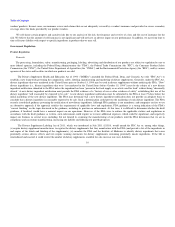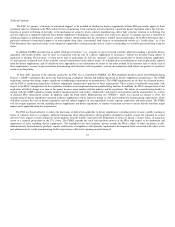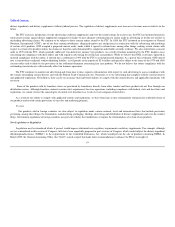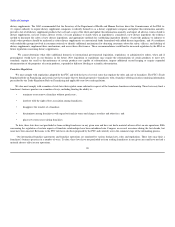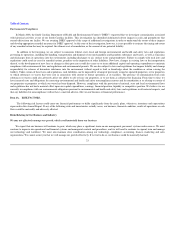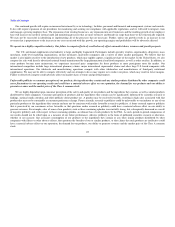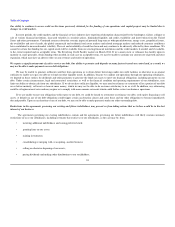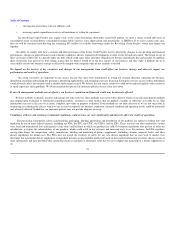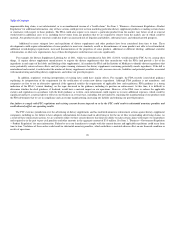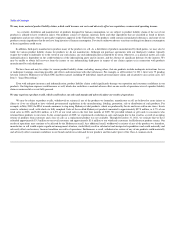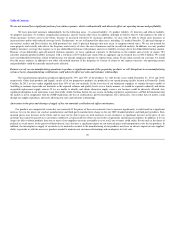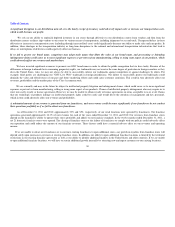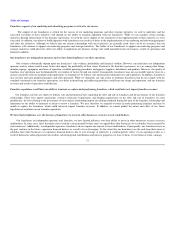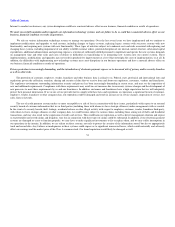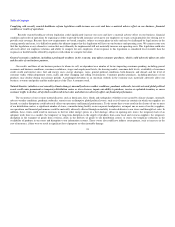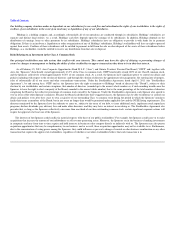GNC 2012 Annual Report Download - page 28
Download and view the complete annual report
Please find page 28 of the 2012 GNC annual report below. You can navigate through the pages in the report by either clicking on the pages listed below, or by using the keyword search tool below to find specific information within the annual report.
Table of Contents
impermissible drug claim, is not substantiated, or is an unauthorized version of a "health claim." See Item 1, "Business—Government Regulation—Product
Regulation" for additional information. Any of these actions could prevent us from marketing particular dietary supplement products or making certain claims
or statements with respect to those products. The FDA could also require us to remove a particular product from the market. Any future recall or removal
would result in additional costs to us, including lost revenues from any products that we are required to remove from the market, any of which could be
material. Any product recalls or removals could also lead to an increased risk of litigation and liability, substantial costs, and reduced growth prospects.
Additional or more stringent laws and regulations of dietary supplements and other products have been considered from time to time. These
developments could require reformulation of some products to meet new standards, recalls or discontinuance of some products not able to be reformulated,
additional record-keeping requirements, increased documentation of the properties of some products, additional or different labeling, additional scientific
substantiation, or other new requirements. Any of these developments could increase our costs significantly.
For example, the Dietary Supplement Labeling Act of 2011, which was introduced in July 2011 (S1310), would amend the FDC Act to, among other
things, (i) require dietary supplement manufacturers to register the dietary supplements that they manufacture with the FDA (and provide a list of the
ingredients in and copies of the labels and labeling of the supplements), (ii) mandate the FDA and the Institute of Medicine to identify dietary ingredients that
cause potentially serious adverse effects and (iii) require warning statements for dietary supplements containing potentially unsafe ingredients. If the bill is
reintroduced and enacted, it could restrict the number of dietary supplements available for sale, increase our costs, liabilities and potential penalties associated
with manufacturing and selling dietary supplements, and reduce our growth prospects.
In addition, regulators' evolving interpretation of existing laws could have similar effects. For example, the FDA recently issued draft guidance
explaining its interpretation of the requirement for the notification of certain new dietary ingredients. Although FDA guidance is not mandatory, and
companies are free to use an alternative approach if the approach satisfies the requirements of applicable laws and regulations, FDA guidance is a strong
indication of the FDA's "current thinking" on the topic discussed in the guidance, including its position on enforcement. At this time, it is difficult to
determine whether the draft guidance, if finalized, would have a material impact on our operations. However, if the FDA were to enforce the applicable
statutes and regulations in accordance with the draft guidance as written, such enforcement could require us to incur additional expenses, which could be
significant and have a material adverse effect on our business in several ways, including, but not limited to, enjoining the manufacturing of our products until
the FDA determines that we are in compliance and can resume manufacturing, increasing our liability and reducing our growth prospects.
Our failure to comply with FTC regulations and existing consent decrees imposed on us by the FTC could result in substantial monetary penalties and
could adversely affect our operating results.
The FTC exercises jurisdiction over the advertising of dietary supplements and has instituted numerous enforcement actions against dietary supplement
companies, including us, for failure to have adequate substantiation for claims made in advertising or for the use of false or misleading advertising claims. As
a result of these enforcement actions, we are currently subject to three consent decrees that limit our ability to make certain claims with respect to our products
and required us in the past to pay civil penalties and other amounts in the aggregate amount of $3.0 million. See Item 1, "Business—Government Regulation
—Product Regulation" for more information. Failure by us or our franchisees to comply with the consent decrees and applicable regulations could occur from
time to time. Violations of these orders could result in substantial monetary penalties, which could have a material adverse effect on our financial condition or
results of operations.
26


